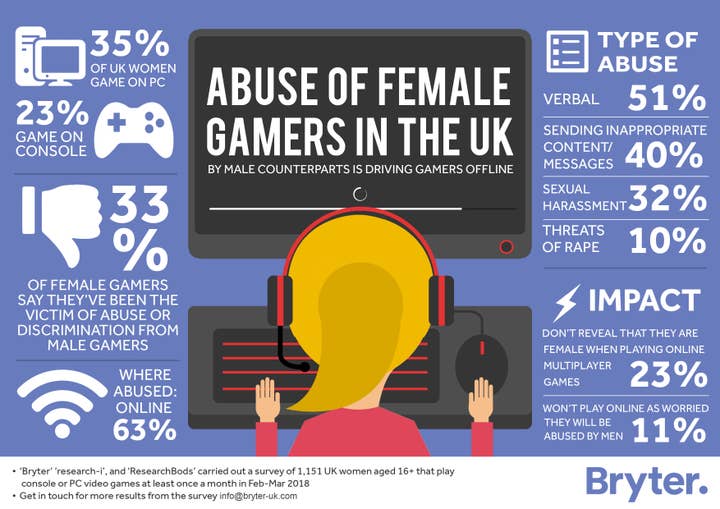One-third of UK women gamers report abuse or discrimination from male gamers
Bryter survey shows many women avoid online play or identification as gamers due to fear of abuse
According to a recent Bryter survey, one-third of women who play video games regularly have experienced abuse or discrimination from male gamers. Of those, over half experienced verbal abuse and 10% have been threatened with rape.
In partnership with Research-i and ResearchBods, Bryter surveyed 1,151 UK women who play video games ages 16 and up. To qualify, participants had to play either console or PC games at least once per month, though 85% reported playing more than one hour per week.
Despite what seems to be a fair amount of gaming from the vast majority of the survey group, over half stated that they didn't consider themselves "proper" gamers, including 27% of the total respondents who reported playing 11-20 hours of games per week and 25% of those who played more than 20 hours per week.
Based purely on numbers, that may seem a perplexing response, but the avoidance of the "gamer" identification seems at least partially attributable to the respondents' views on the gaming industry and its relation to women as a whole. While 62% had an overall positive view of the industry, 18% agreed that the industry was sexist; 26% described it as "masculine."

That "masculine" view was reflected even more resoundingly in responses regarding diversity in both games themselves and industry representation. 71% of respondents felt women were oversexualized in games, 60% thought there were not enough strong female characters, 55% felt women were underrepresented, and 51% found there was a lack of racial diversity among women in games. Over half thought that the number of female game characters had improved over time, but less than half felt their depiction had improved or that more games were being designed with women in mind.
Even fewer felt that the industry was doing more to encourage and welcome women gamers (41% thought it was) or women interested in gaming careers (30%). 62% did not feel women were well-represented in the industry currently.
Those views on the industry are also very likely colored by participants' personal experiences gaming. 33% of those surveyed reported experiencing abuse or discrimination from male gamers, whether that be while playing online, in-person, or through some other contact. Of those who reported abuse, 52% had experienced verbal abuse and 46% had sexually inappropriate remarks directed at them. 40% were sent inappropriate content or messages. 10% were threatened with rape.
As a part of the survey, nearly 200 of the respondents included comments specifying the language that had been used toward them from men while gaming. Along with the aforementioned rape threats, graphic sexual and violent remarks, and horrifying verbal abuse, a significant chunk of women's gaming experiences included men explicitly telling them that they didn't belong. Many were spoken to in a condescending way as soon as they were identified as a woman; others had their ability to play or understand the game questioned because of their gender.
Only 15% felt that there were adequate processes in place to deal with this kind of abuse.
The consequence for this goes beyond simple refusal to identify as a "gamer." 72% of those who said they had not personally experienced abuse from male gamers still balked from certain aspects of online multiplayer due either to fear of negative reactions from other players, or perceptions of it as a male-dominated space. 20% of all participants reported avoiding speaking in online multiplayer games due to fear of negative reactions from male players, while 11% avoided playing games online altogether for the same reason. Over one-third saw the online gaming space in general as a male-dominated space.
